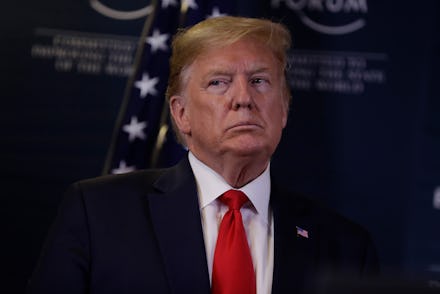The infamous Trump travel ban might be expanding

When President Trump took office, he quickly followed up on his campaign promises to crack down on immigration. One of his most infamous moves was the implementation of a highly contested "Muslim ban," which restricted travel from certain mostly Muslim-majority countries. Now, Trump plans to extend his travel ban with the announcement expected to come on the original order's three-year anniversary.
Officially titled "Protecting the Nation from Foreign Terrorist Entry into the United States", the initial ban included North Korea, Venezuela, Syria, Libya, Yemen, Somalia, and Iran. The fact that most of those countries are Muslim-majority — plus the president's own history of Islamophobic remarks — betrayed Trump's true focus.
The ban first went into effect on Jan. 27, which means its anniversary is next Monday. According to Politico, Trump may make his announcement to extend the ban as early as then. Although the new list of countries isn't finalized, those under consideration are Belarus, Myanmar, Eritrea, Kyrgyzstan, Nigeria, Sudan, and Tanzania.
The White House failed to comment on any details of the expansion, Politico reported. However, spokesman Hogan Gidley praised the original order as "profoundly successful" in "protecting" the U.S.
Numerous civil rights organizations and several states have filed legal challenges regarding the ban. This saw the removal of several countries named in the first iteration of the ban (Iraq, Sudan, and Chad). According to a report from The Associated Press earlier this month, one source said that the expansion could include these countries once again.
“Different Muslim ban — same xenophobic administration,” Rep. Pramila Jayapal (D-Wash.) told AP. “An expanded Muslim ban will worsen our relationships with countries around the world. It won’t do anything to make our country safer. It will harm refugees, alienate our allies, and give extremists propaganda for recruitment.”
Federal judges blocked the travel ban's first iteration in 2017. However, the order has seen multiple changes since then and, in June 2018, the Supreme Court upheld the ban's third iteration, overturning a lower court's injunction from the previous year. This decision allowed the fight against the ban to carry over into what will now be its fourth year.
"Tens of thousands of American families are already hurting and separated because of this bigoted and cruel ban," Farhana Khera, executive director of civil rights organization Muslim Advocates, said in a statement. "Doubling down on it won’t make any of us safer but it will allow the president to continue using anti-Muslim hate as a political weapon."